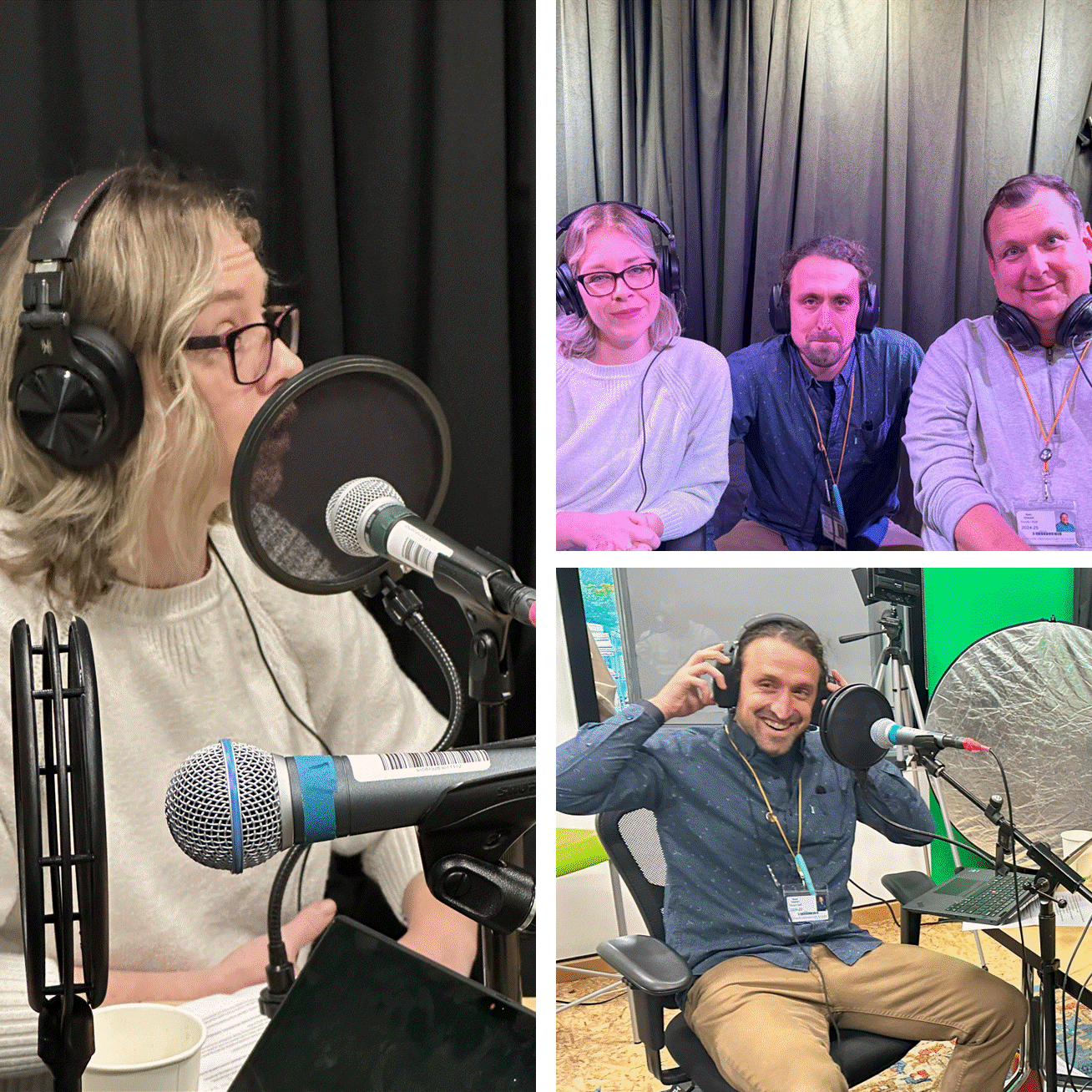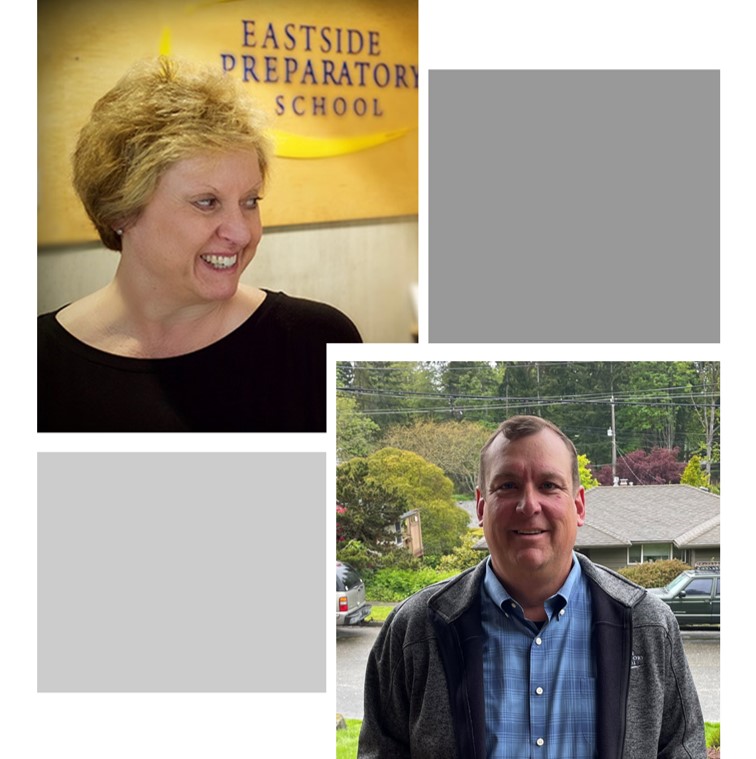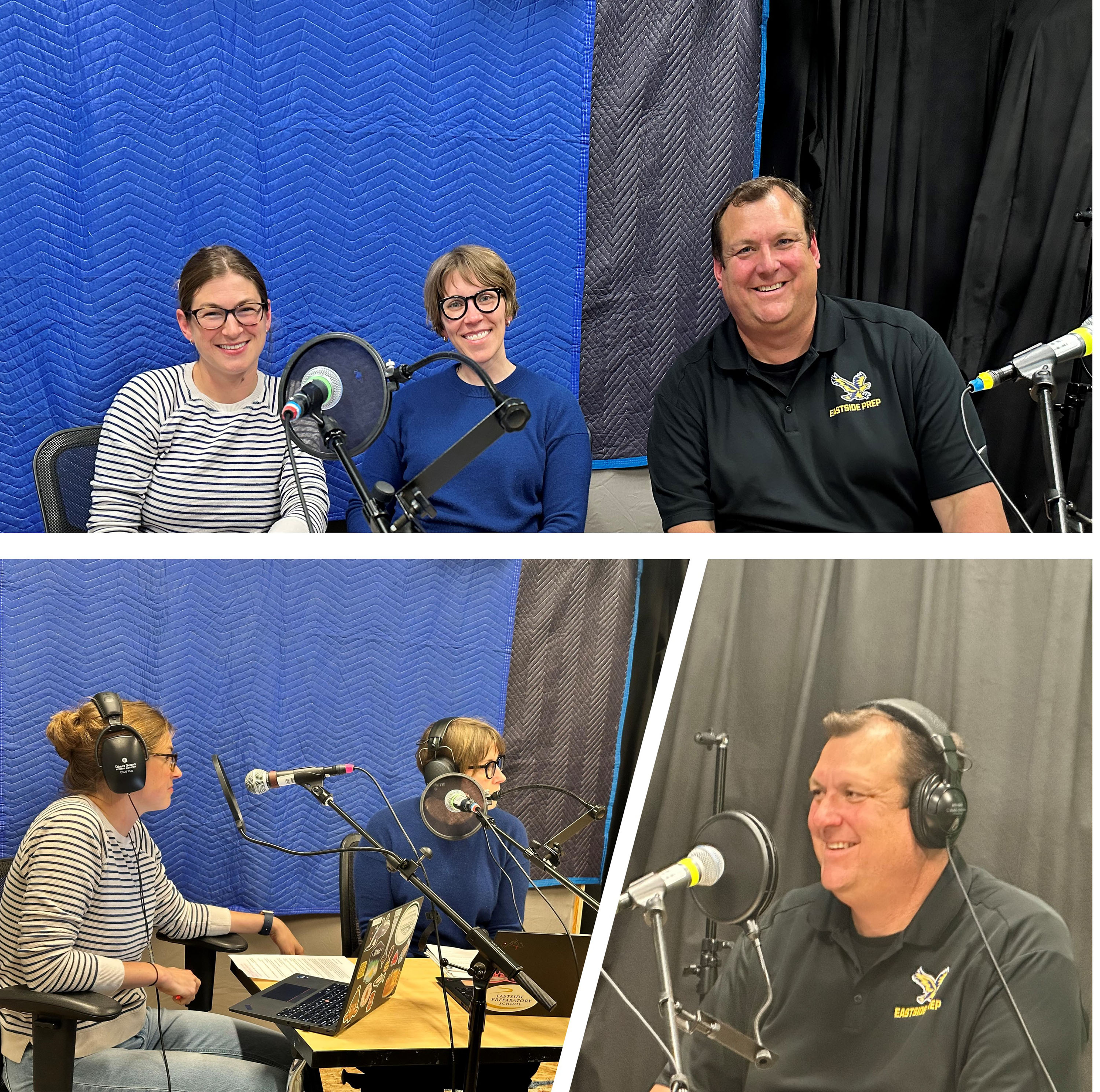Episode Transcript
[00:00:01] Speaker A: Welcome to Insightful Questions, the podcast where we dive deep into the big ideas shaping Eastside Prep's community and beyond.
I'm your host, Sam Uswick.
Each episode, I'll be sitting down with different members of our EPS community.
Join us as we ask the insightful questions that help us lead with compassion and listen with intention.
Let's get started.
We're thrilled to have two fantastic guests with us today to talk about the role of technology and artificial intelligence in education.
First up is Jonathan Briggs, Eastside Prep's Director of Strategy, technology and Innovation. Jonathan's been part of the EPS community since 2005, starting out as a physics teacher and technology director. And over the years, he's helped launch some of our biggest innovations, like the one to one laptop program canvas as our learning management system. 411 independent projects, and most recently, our partnership with colleague AI. He's been at the center of making sure innovation isn't just a buzzword at eps, but something that's truly part of how we all learn and grow.
Also Joining us is Dr. Min Sun, a professor at the University of Washington, Go Huskies and co found of Colleague AI. She specializes in the integration of artificial intelligence and machine learning in education, teacher learning, and educational policy.
Her research is funded by prestigious organizations like the National Science foundation and the Institute of Educational sciences under the US Department of Education and other private foundations.
Dr. Sun's work aims to elevate the quality of education for for every learner by harnessing the power of data, science and technology.
Dr. Sun and J.B. welcome to the Insightful Questions podcast.
[00:02:08] Speaker B: Thank you. It's good to be here.
[00:02:10] Speaker C: Thank you so much for having me.
[00:02:12] Speaker A: Okay, so let's get started.
How do you see empathy shaping the way we talk about and use AI in schools, especially as new partnerships like ours begin?
[00:02:25] Speaker B: I think it's similar to almost everything else that we've integrated into schools over the years. The school is not about the AI. It's not about the tools. It's about the student experience.
When you get new tools, you have a chance to impact that student experience. And so any new tool is going to bring new challenges and new opportunities. Through the conversations with everyone involved, whether it's the teachers, the parents, the students, to figure out what does this new technology afford and how can you take advantage of all the best parts of it, and how do you mitigate the things that it makes more difficult? When Google came around in the early 2000s and the late 90s, it made accessing information much easier. But it also meant finding how to do things without thinking about it also much easier. So we've over the years figured out ways to decide when to use Internet and when not to. And we're going to have to go through that same process with AI.
[00:03:18] Speaker C: I really appreciate that point of view about centering on our students and families and parents.
We as a tech developer really appreciate our conversation Start and Centered Empathy. First and foremost, having empathy for us mean embracing a human centered AI partnership framework. We build our technology to improve educators work efficiency so that they can spend less time on tedious administrative tasks that take them away from their students or behind the desk so that they can spend more time on developing meaningful connections with their students, with their family, in the classroom and inspire them.
Moreover, empathy for us also mean that offering a safe space to allow students and educators to experiment and and explore. We know that AI adoption process will not be even. It will vary across a different classroom subject and even for different group of students, allowing educators and students to have a self dialogue. Meaningful communication about AI is crucial and I'm glad that our partnership is developed with empathy at our core. The bottom line is technology should enhance rather than diminishing the human aspect of education.
[00:04:50] Speaker A: I really appreciate that. I mean there's such empathy for the life of a teacher in what you're saying. I don't think I've ever heard a teacher say, you know, I'm really sick of working with kids, I'm going to go to my desk and grade now. It's the total opposite. And to free up that precious resource is so important. So Dr. Sun, can you tell us a bit about colleague AI and what excites you about starting a partnership with a school community like ups?
[00:05:16] Speaker C: Colic AI is startup spinoff from the College of Education at the University of Washington is a comprehensive education technology platform where our AI agents serve as knowledgeable colleagues for educators and friendly buddies for all learners.
We bring several innovations to education technology development.
We embed effective teaching and learning research into the latest AI technology.
Our AI agents understand the concept like instructional rigor, students learning progression that actually promote students critical thinking and creativity.
Second, colleague AI is co designed with and for educators and students.
They work alongside with our researchers and engineers. In fact we currently work with several EPS students and their teachers in co design project. This is where this partnership excite me the most in terms of being able to leverage on the talent of the educators and students here in the school.
I could not be more impressed by the dedication, the innovation and thoughtfulness of the EPS teachers and students into our Product development, as well as what they bring into AI adoption and students learning journey.
Third, we actually build a robust supporting system for education schools. We offer technical assistance. We also offer trainings for schools to develop both their student and their faculty's AI literacy and competency, because we sincerely believe that we humans make technological possibilities into meaningful learning experience for our students.
As of today, colleague AI serve about 15,000 users and hundreds of schools nationwide.
[00:07:29] Speaker A: Oh, that's fantastic.
And this is the kind of partnership and the kind of relationship I think more schools need with more startups, other businesses, organizations, educational institutions. We all have a lens on learning, a lens on society. And by putting those perspectives together, you get kind of this magical moment. So one of the more alarmist headlines I read over the last few weeks was, is AI coming for your job?
[00:07:57] Speaker B: And.
[00:07:58] Speaker A: And no one wants to feel like we're talking about an assault on basic needs, right? Like your livelihood.
JB and I have sparred a bit on what AI can do and how far it will go. And I think the simple answer is, no one really knows yet. I do have a fundamental belief, but there are aspects of good teaching that AI simply can't replace.
So, jb, as EPS begins exploring more ways to integrate AI thoughtfully, how are we making sure that human connection and dialogue remain at the center?
[00:08:33] Speaker B: I think in some ways the question is human connection and dialogue is at the center. How do we have AI support that? I think one of the things that you'll read reports that say, there's a report out there that teaching is one of the most replaceable professions by AI, and it's looking at the skill set that teachers need in order to deliver a class experience. But what reports like that are missing is that the teacher's role in the classroom is really to inspire students to want to do the hard work of learning. It's not pleasant to increase the capacity of your own thinking.
It's work in the same ways that exercises work.
And that's the core function of a teacher. It hasn't been to be the knowledge base of everything for quite some time now. It's really encouraging a bunch of students to come along with you on a journey to develop their thinking. And I think if you look at it in that context, AI has the ability to surface connections that you might have noticed. It has the ability to bring in information that's specific to student interests that would be too onerous to do manually. There's just not enough time to research everything that every student is into. But you can start to imagine these things Being done without a whole lot of extra effort. I also am pretty confident in humanity's want to just have more. So every other time we built a technology that increased the capacity of what we could do, our expectations of what life could be has just gone up to match the new capabilities. AI is in some ways maybe a little different that it's starting to replace our own cognitive ability. But I also think humans are very creative in figuring out how to they can get more out of the same amount of time on this planet.
[00:10:15] Speaker A: So for both of you, as schools move into artificial intelligence even early on, what risks or challenges do you see if empathy is not part of the.
[00:10:26] Speaker C: Conversation we observe by working with educators and schools, we notice that without centering and empathy with we can potentially run into some risks such as creating these disconnect between the technological advancement and our human needs in education.
Similar as GB mentioned, which is the opposite side of the coin is one risk is the possibility that educators may over rely on AI technology Without their own assessment about the accuracy, usefulness and relevance of AI generated information.
Educators still need to use their own professional judgment to make instructional decisions.
And similarly for students, we also worry that students may potentially offload. There are very important cognitive learning tasks to to AI that is not what we want. And the third risk potentially we observe at a system level, either at the school or district level. Without open dialogue with your important stakeholders in your community, schools may run into the risk of damaging trust with their parents, with their students, with their educators who may have a different point of view about AI technology.
So we really need to embrace those hard questions and also embrace various feelings and make everyone feel like they are hurt. Got other people just understanding about their point of view in the AI integration process.
[00:12:16] Speaker A: So how is your team approaching those challenges in the early design phases?
[00:12:21] Speaker C: Yeah, that's a great question. So we very explicit of addressing some of the risks we just talked about.
Particularly with offloading cognitive tasks to AI. We draw on learning science theories to develop several product features. The first is our AI agents can guide students active thinking without directly feeding the correct answer to them. Encouraging students to engage in meaningful dialogue with AI as well as with their educators and peers.
The other product innovation we have is our AI show their thinking process and also encourage our users to reflect and intimately improve.
So to accomplish this, we develop our own solutions such as lesson quality measures simulation with a virtual coach for educators. We also develop a nudging system to offer these gentle actionable suggestions to both our students and teachers in the moment when they are Having conversation with AI.
[00:13:33] Speaker A: Yeah.
[00:13:33] Speaker B: I'd just add that one of the reasons we're so excited to work with Colleague is because of that empathetic approach of getting into classrooms, seeing how tools are used in the complex environment of a school. There are ed tech companies out there that think that they've solved it and go off into their offices and write a program that essentially solves the founder's personal experience in schools and that may be valid for them. If you really want to have an impact, you need to understand what teachers and students are doing in the classroom right now in 2025 and how do you have a positive impact and what assumptions are you having that are false and what assumptions are you having that are correct? And so their approach is one that we're excited to be a part of.
[00:14:15] Speaker A: Though we're at the very beginning. What do you hope the partnership between EPs and colleague AI will make possible for our students and teachers?
[00:14:23] Speaker B: I think, I mean, at a fundamental level, if you ever take a teenager to anything that's a glimpse of their future, whether it's a college campus, whether it's a work environment, whether it's a startup, whether it's like an art gallery, you can see them light up, it's exciting. And so we're excited to have a startup on campus and hopefully we'll have other glimpses into students future on campus that will help bring a little bit of that relevance and that wondering about what their future might hold to students. We are also, we know that as a school, as much as we have read and have played and researched about how AI may impact us, there are people out there running companies where this is their 80 hour a week job. We want to benefit from their learning and we think that we can provide the benefit of an environment to test assumptions at the same time. So there's a real symbiotic relationship between both of us being in the same location.
[00:15:18] Speaker C: That's really well said. We are committed to not only offering Colleague AI this innovative tool to EPS students and teachers, more importantly, we plan to offer workshops, trainings and make our subject experts available to EPS students and faculty.
[00:15:38] Speaker A: What we're excited about having a separate space for programming is that we are going to create a conduit to the outside world for our students. In one space we'll have a conduit to the natural world. In another space we'll have a conduit to the professional world, like seeing what it means to work for a startup. All of that is part of how we're thinking about Innovation in the secondary educational space, which is quickly preparing students to make more impact in their next chapter. Be it going to college, going right to a startup, taking a gap year, being in their community. So it's very exciting.
Well, to finish up, let's look forward as this partnership grows. What's your vision for how schools and startups can work together to create technology that is not only smart, but also compassionate?
[00:16:33] Speaker C: If we consistently implement the strategy we talk about today, which include centering on human needs, open dialogues with our community, and continuous innovation with instructional rigor, I'm confident that our partnership will uniquely enable us to create technology that is not only smart, but also compassionate.
[00:16:58] Speaker B: Schools have often under appreciated their own value. There is value in the community we create, there's value in the classroom experiences we create. And, and there are people out there that would like to experience that meaning, experience that environment and that we can work with companies and other outside organizations and share something that we have a surplus of, which is we've got tons of meaning, tons of young kids, tons of excitement and enthusiasm and we can give our own students access to experiences that you don't normally find in schools. So it's a complicated logistical thing to pull off, but other than that, it's a pure win win to overuse a phrase.
[00:17:41] Speaker A: Well, I so appreciate speaking with y' all today. You know, I'm kind of having a couple of go back in time moments. You know, when I first started at Eastside Prep, our upper school program was a one to one laptop program. But our middle school wasn't and JB and I partnered on that project. But I'm also flashing back because in the late 90s I was spending all my time in Miller hall earning my master's in teaching with the College of Ed. And so to kind of come full circle to be able to partner, to think about improving the day to day experience of our students and improving the day to day experience of our faculty is just such a treat. So thank you both so much.
[00:18:19] Speaker C: Thank you so much.
[00:18:20] Speaker B: Thank you for having us.
[00:18:23] Speaker A: For more insights, be sure to check out the EPS weekly news every Friday.
[00:18:32] Speaker C: Sam, it.


